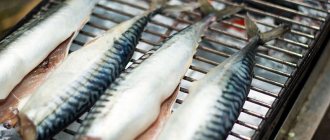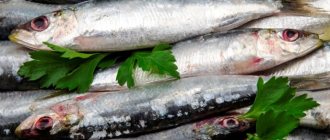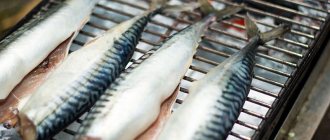Fresh (raw) mackerel: calorie content per 100 grams, nutritional value, vitamins, minerals
The calorie content of raw mackerel per 100 grams is 191.4 kcal. 100 g of fish contains:
- proteins – 17.9 g;
- fats – 13.1 g;
- carbohydrates – 0 g.
Read: Red beans: nutrition, calories
100 g of fresh mackerel contains the following set of vitamins and minerals (in brackets, % of substances from the daily value for an adult):
- A (1);
- B1 (8.1);
- B2 (19.9);
- B4 (13.1);
- B5 (16.9);
- B6 (40.1);
- B9 (2.4);
- B12 (399);
- C (1.4);
- D (160);
- E (10);
- K(4.3);
- RR (59);
- potassium (10);
- calcium (4.1);
- magnesium (13.9);
- sodium (7.8);
- iron (9.5);
- iodine (31);
- cobalt (199);
- manganese (6);
- copper (22);
- molybdenum (5.6);
- selenium (79);
- fluorine (36);
- chromium (119);
- zinc (5.9).
Mackerel baked in the oven in foil: calorie content per 100 grams, bju
Calorie content of mackerel baked in the oven in foil without oil per 100 grams is 178 kcal. 100 g of fish contains:
- proteins – 17.9 g;
- fats – 11.6 g;
- carbohydrates – 1 g.
Read: Calorie content of fried potatoes with onions
Cooking steps:
- 0.25 kg of fish is cleaned of entrails, the tail and head are trimmed;
- mackerel is cut into small pieces of equal size, salted to taste;
- the fish is placed on foil, 25 g of chopped tomato is placed between the pieces;
- mackerel wrapped in foil is baked in the oven over medium heat for half an hour.
Cold and hot smoking
When many people hear the word mackerel, they immediately imagine this smoked fish. Indeed, this cold or hot smoked product is incredibly tasty. The calorie content of cold or hot smoked mackerel increases slightly. The calorie content is already approximately 221 kcal per 100 grams of product.
What is the difference between the cold and hot smoking method? The answer is in the title. In cold smoking, fish carcasses are treated with cold smoke. A cold smoked product gains additional shelf life.
With the hot smoking method, the mackerel is exposed to hot heat. Hot smoked mackerel has a richer taste and aroma.
This dish should not be overused. It is known that smoked products are not very healthy. They have a bad effect on the liver and pancreas.
Baked mackerel: calorie content per 100 grams, bju
Calorie content of baked mackerel per 100 grams is 182 kcal. 100 g of fish contains:
- proteins – 16.5 g;
- fats – 13.2 g;
- carbohydrates – 0.5 g.
Steps for preparing baked mackerel:
- 0.4 kg of mackerel is cleaned from the entrails and the fillets are separated from the bones. To make it easier to separate the fillets, it is recommended to work not with frozen, but with slightly thawed fish;
- make sure that not only the insides are removed, but also the film covering the abdomen;
- the prepared fish is salted and peppered, placed on foil and left for a short time;
- at this time, the filling for the dish is made: the onion is peeled and cut into cubes, the parsley is chopped, the lemon is cut into circles;
- Place parsley, onion and lemon slices on half a fish fillet. The resulting “sandwich” is covered with the other half of the fish fillet;
- the fish is wrapped in foil and baked in the oven for 40 minutes. If the carcass is large, then the baking time is increased to 60 minutes.
Mackerel with vegetables in the oven: calorie content per 100 grams, bju
Calorie content of mackerel with vegetables (baked carrots and onions) in the oven per 100 grams is 205 kcal. 100 g of dish contains:
- proteins – 12.5 g;
- fats – 16.5 g;
- carbohydrates – 3.6 g.
Read: Calorie content of pineapple per 100 grams
100 g of product contains the following set of vitamins and minerals (in brackets, % of substances from the daily value for an adult):
- A (65);
- beta carotene (71);
- B1 (5.2);
- B2 (11.9);
- B4 (0.9);
- B5 (2.1);
- B6 (3.1);
- B9 (1,2);
- C (3.1);
- D (106);
- E (25);
- K (3.8);
- RR (34);
- potassium (10);
- calcium (3.4);
- silicon (29.1);
- magnesium (9.2);
- sodium (18.1);
- phosphorus (21);
- chlorine (18);
- iron (8);
- iodine (24);
- cobalt (159);
- manganese (8.9);
- copper (19.1);
- molybdenum (14.1);
- fluorine (26);
- chromium (80);
- zinc (7.6).
Stewed mackerel in sour cream: recipe
Using this oven-baked recipe, quickly and deliciously prepared, you can feed your household. At the same time, this dish will not only help saturate the body and satisfy hunger, but will also bring benefits.
First you need to prepare the ingredients, namely:
- mackerel - 1 pc.;
- potatoes - 500 g;
- carrots - 100 g;
- onion - 2 pcs.;
- tomatoes - 2 pcs.;
- sour cream (15% fat) - 100 g;
- herbs, salt, vegetable oil, spices - to taste.
The mackerel is cleaned and cut into small pieces. Vegetables should also be peeled, washed thoroughly under water and cut. Next, you need to lay out the ingredients in layers in a fireproof form, greased with vegetable oil:
- 1st layer - potatoes;
- 2nd layer - fish;
- 3rd layer - onions and carrots;
- 4th layer - tomatoes;
- 5th layer - greens.
Each layer needs a little salt. Then add sour cream to the pan and place it in the oven for 30 minutes. Cooking mackerel in the oven is quick and tasty. The dish can be served without additional side dish.
Stewed mackerel: calorie content per 100 grams, bju
Calorie content of stewed mackerel per 100 grams is 159 kcal. 100 g of fish contains:
- proteins – 23.7 g;
- fats – 6.2 g;
- carbohydrates – 0 g.
Stages of cooking fish:
- 0.6 kg of cleaned fish is fried on each side in 1 tablespoon of vegetable oil;
- add 1 chopped onion, 1 grated carrot to the fish;
- pepper and salt the dish to taste;
- 30 g of sour cream mixed with 0.2 liters of water is poured into a frying pan with a fish-vegetable mixture;
- The fish is stewed under the lid for 20 minutes.
Mackerel in the microwave calorie content. Canned
Canned mackerel is a versatile fish product with a wide range of culinary uses. On an industrial scale, such fish is preserved in several ways:
- in its own juice;
- In oil;
- in tomato sauce;
- in tomato with vegetables.
Since mackerel meat has sufficient fat content, the most common option is canning in its own juice. Such canned fish are characterized by a delicate structure and rich taste, and since they are produced without oil, they have a very low calorie content, amounting to 137.6 kcal per 100 grams.
The calorie content of mackerel preserved by other methods is higher, which is due to the presence of vegetable oil in the composition. On average, this indicator is at the following level:
- in oil - 278 kcal/100 g;
- in tomato sauce - 241.5 kcal/100 g;
- in tomato with vegetables - 189.0 kcal/100 g.
Any version of canned mackerel has two important advantages:
- allows you to preserve the excellent taste and healthy qualities of fish for a long time;
- is an independent snack, ready to eat at any time and does not require additional cooking.
Important! Despite the long heat treatment, as a result of which some of the vitamins are lost, canned mackerel acquires a number of additional beneficial properties. This is due to the fact that the seeds are boiled in it and consumed together with the pulp.
It is fish bones that are the richest source of macro- and microelements that ensure bone strength and support for the entire musculoskeletal system. For this reason, the canned product is recommended to be included in the diet of sports and medical nutrition.
Natural canned mackerel contains high amounts of calcium, magnesium, phosphorus, lycopene and antioxidants, which are not destroyed by heat. Polyunsaturated fatty acids necessary for proper nutrition of the brain and proper functioning of the human endocrine system are also preserved. Such canned fish are recommended for use during excessive physical or sports stress, increased intellectual activity, and also for the successful solution of cardiac problems. Using a canned fish product in your diet reduces cooking time and is convenient to take on trips or use for a quick snack.
The harm of such products can only be due to the increased content of the fat component in the composition, due to which the initial calorie content of mackerel significantly increases. For this reason, canned fish in its own juice are considered the healthiest. In addition, preservatives are often added to industrially produced products, and the use of such chemicals has a negative impact on health. Therefore, given all the benefits of natural canned mackerel, it is best to prepare them yourself. But it is necessary to take into account another danger, which is the possibility of infection with botulism. This risk especially increases when cooking at home, when the required temperature regime is not observed. In addition, botulism can develop in jars after the expiration date or if stored improperly.
Store-bought canned mackerel is not recommended for use by children under 3 years of age, pregnant and lactating women, primarily due to the presence of preservatives, which, like the fish itself, contain many allergens. In addition, saltwater fish can be high in mercury, which is also harmful to health.
Store canned fish in a dry room in compliance with the following temperature conditions:
- in oil - from 0°C to +20ºC;
- in tomato - from 0°C to +5ºC.
The average shelf life of a store-bought product is 3 years, but there may be exceptions, so you need to pay attention to the date indicated by the manufacturer on the packaging. Homemade canned food in oil can be stored for 12–24 months, and in tomato sauce for 6–18 months. After opening the can, the contents should be immediately transferred to a glass container and consumed within 24 hours. When exposed to oxygen, canned fish flesh quickly oxidizes, which increases the risk of poisoning.
In any case, when purchasing canned food, you must carefully study the label. It indicates not only the shelf life, but also the method of preparation, chemical composition, nutritional value and calorie content of mackerel. The jar should not be damaged or bloated. After opening, you need to evaluate the appearance, which, like the aroma, should be natural. If there are any suspicious changes, the product should not be consumed so as not to risk your health.
Boiled mackerel: calorie content per 100 grams, nutritional value, vitamins, minerals
Calorie content of boiled mackerel per 100 grams is 210 kcal. 100 g of product contains:
- proteins – 19.8 g;
- fats – 14.5 g;
- carbohydrates – 0 g.
Read: Calorie content of red bell pepper
100 g of boiled fish contains the following set of vitamins and minerals (in brackets, % of substances from the daily value for an adult):
- A (2.4);
- B1 (4.6);
- B2 (14.1);
- D (168);
- E (14);
- RR (65);
- potassium (6.6);
- calcium (2);
- sodium (3);
- phosphorus (22);
- chlorine (8.1);
- iron (8.2);
- iodine (32);
- cobalt (224);
- manganese (5.7);
- copper (22.9);
- molybdenum (6.3);
- fluorine (39.1);
- chromium (122);
- zinc (7.6).
Nutritional value of mackerel
The calorie content of fresh mackerel of different types reaches 200 kcal, which is quite a high figure. However, fish is rich in microelements, vitamins, and most importantly, unsaturated fatty acids. About 100 g of product can satisfy half the daily protein requirement. Thanks to the high phosphorus content, the condition of teeth and nails significantly improves.
The share of fat is about 17%, protein – no more than 18%.
The product is recommended for people with different forms of diabetes. The benefits of frequent consumption of this fish are reduced due to the rather high fat content. This figure varies depending on what season it was caught. The spring catch is considered the most nutritious, while in the fall the fat content reaches more than 30% of the total weight of the fish.
Salted mackerel in brine without oil: calorie content per 100 grams, nutritional value, vitamins, minerals
Calorie content of salted mackerel per 100 grams is 215 kcal. 100 g of snack contains:
- proteins – 17.2 g;
- fats – 13 g;
- carbohydrates – 6.8 g.
Read: Calorie content of pea porridge per 100 grams
Salted mackerel has a lot of contraindications. Thus, the product should be discarded if you have heart disease, vascular disease, a tendency to edema, exacerbation of gastrointestinal diseases, or impaired water-salt balance. Fish is contraindicated when losing weight and during a diet.
100 g of salted mackerel contains the following set of vitamins and minerals (in brackets, % of substances from the daily value for an adult):
- A (5.1);
- B1 (11.1);
- B2 (15.9);
- B4 (11.9);
- B5 (16.1);
- B6 (18.9);
- B12 (269);
- D (148);
- E (10);
- RR (41);
- potassium (13);
- calcium (8.6);
- magnesium (20);
- sodium (560);
- phosphorus (28);
- chlorine (490);
- iron (13);
- cobalt (29);
- manganese (3.1);
- copper (13);
- molybdenum (29);
- selenium (74);
- fluorine (3.8);
- zinc (5.9).
Salted
Many people also like this product salted. Salted mackerel is a worthy competitor to herring. The calorie content of mackerel in this form is already significantly increased. It is 305 kcal per 100 grams.
Salted mackerel is quite easy to prepare. To do this, take a whole fish and clean it from the insides. Fill the empty belly with table salt. Then place the fish filled with salt in a stainless steel bowl. Cover the dish with a towel and set it aside in a cool place. Store the carcass like this for at least three days, maximum six days.
The thicker the carcasses, the longer the salting time will take. During the process, liquid will be formed that must be drained so that the carcasses do not spoil. You can also add your favorite spicy spices to the salt to make the salted mackerel even tastier.
In this form, this product should also not be abused. People with diseases of the gastrointestinal tract, kidneys, liver, as well as those who have hypertension should be especially careful when adding this product in salted form. And the calorie content of mackerel in this form is much higher.
Mackerel in our country occupies one of the leading positions in terms of consumption and popularity among the population. In every city in grocery stores you can find cold smoked mackerel, beloved by many. Salted or fresh-frozen fish carcasses, as well as canned mackerel, are in demand.
The abundance of this fish is explained simply - mackerel has a very wide geographical habitat and its population is present almost everywhere in the sea. Schools of this fish are found in the Mediterranean, Black, North and Baltic seas. It migrates in the waters of the Marmara and Barents Seas.
Mackerel is a versatile fish. It is delicious boiled, fried or baked, and simply as a cold snack (salted, smoked, marinated). The relatively low calorie content of mackerel adds a big plus to this fish - it can be used in diets for weight loss (boiled or baked dishes) and in diet menus (1-2 times a week).
Lightly salted mackerel: calorie content per 100 grams, nutritional value, vitamins, minerals
Calorie content of lightly salted mackerel without oil per 100 grams is 177 kcal. 100 g of fish contains:
- proteins – 17.9 g;
- fats – 13.1 g;
- carbohydrates – 0 g.
Read: How many calories are in dried dates?
100 g of product contains the following set of vitamins and minerals (in brackets, % of substances from the daily value for an adult):
- A (5.1);
- B1 (1.4);
- B2 (11.1);
- B4 (19.9);
- B6 (22);
- B9 (3.9);
- B12 (398);
- D (250);
- E (17);
- K(6.6);
- RR (16);
- potassium (22);
- calcium (6.5);
- magnesium (15.1);
- sodium (340);
- phosphorus (33);
- iron (7.7);
- copper (10.1);
- selenium (135);
- zinc (9.1).
Smoked mackerel: calorie content
You can cook fish in different ways. Many people prefer to smoke it. The result is a real delicacy, and smoked mackerel looks very appetizing. The calorie content of fish in this form is 221 kcal/100 g. There are various smoking technologies. This has virtually no effect on the calorie content of the product.
In stores you can find fish that was smoked not with smoke, but with chemical substances. Fish carcasses immersed in this “marinade” acquire a pleasant golden hue. This makes the product look appetizing. But unlike fish smoked in the traditional way, such mackerel will not benefit the body. And in some cases it can even cause serious harm.
Mackerel fried in a frying pan: calorie content per 100 grams, nutritional value, vitamins, minerals
Calorie content of mackerel fried in oil per 100 grams is 220 kcal. 100 g of dish contains:
- proteins – 21.2 g;
- fats – 17.4 g;
- carbohydrates – 0 g.
100 g of product contains the following set of vitamins and minerals (in brackets, % of substances from the daily value for an adult):
- A (1.3);
- B1 (8);
- B2 (20.1);
- B5 (21.9);
- B6 (50);
- B9 (3);
- B12 (505);
- D (201);
- E (20);
- K(5.4);
- RR (73);
- potassium (13);
- calcium (4.8);
- magnesium (13.9);
- sodium (23);
- phosphorus (41);
- chlorine (21);
- iron (10);
- iodine (39);
- cobalt (256);
- manganese (6.3);
- copper (26);
- molybdenum (8.1);
- fluorine (46);
- chromium (139);
- zinc (7.3).
To prepare the dish you need:
- wash, peel and cut 0.75 kg of fish into equal-sized pieces;
- bread the fish pieces in 20 g of flour and salt;
- fry the fish on each side in a frying pan with sunflower oil.
Steamed mackerel: calorie content per 100 grams, nutritional value, vitamins, minerals
Calorie content of steamed mackerel per 100 grams is 190 kcal. 100 g of such fish contains:
- proteins – 17.9 g;
- fats – 13.3 g;
- carbohydrates – 0 g.
Read: Benefits of blueberries for the body
Steamed mackerel is a source of fatty acids for weight loss, during dieting and for restoring strength during heavy physical and mental stress. At the same time, the high fat content of the product does not allow mackerel to be included in the diet during exacerbation of gastrointestinal diseases.
100 g of steamed mackerel contains the following set of vitamins and minerals (in brackets, % of substances from the daily value for an adult):
- A (1);
- B1 (8.1);
- B2 (20.1);
- B2 (13.1);
- B5 (16);
- B6 (39);
- B9 (2.4);
- B12 (398);
- D (164);
- E (10);
- K(4.3);
- RR (59);
- potassium (10);
- calcium (5);
- magnesium (13.1);
- sodium (7.6);
- phosphorus (34);
- chlorine (7.5);
- iron (9.5);
- iodine (31);
- cobalt (199);
- manganese (6);
- copper (20);
- molybdenum (5.8);
- selenium (82);
- fluorine (36);
- chromium (111);
- zinc (5.6).
Chemical composition and nutritional value of mackerel
The beneficial properties of mackerel are determined by its chemical composition. This is a great natural source of vitamins: A, D, E, H, group B. 100 grams of fish provides 400% of the body's recommended daily requirement for vitamin B12, which promotes proper absorption and breakdown of fats. Among elite fish varieties, mackerel holds the record for the content of omega-3 polyunsaturated fatty acids. It contains important micro- and macroelements - phosphorus, iodine, fluorine, calcium, potassium, manganese, magnesium, iron. To provide the body with the daily norm of phosphorus and potassium, you need to eat 300-400 grams of mackerel.
Among the elements of nutritional value, protein is the highest. It is absorbed by the human body 3 times faster than beef or chicken protein. A 200 gram portion of mackerel will provide the daily requirement of this product. And its calorie content is 2 times less than that of white fish. 100 grams of raw mackerel contains about 200 calories. Fish has the highest fat content in the autumn, reaching 30% of the total weight. Autumn mackerel is a source of vitamins and omega-3 fatty acids. The ratio of proteins, fats and carbohydrates of mackerel is 1:07:0.
Nutritional value of fresh mackerel (KBZHU):
Despite its high calorie content, mackerel is very healthy. It can be included in diets for weight loss, as it contains easily digestible proteins and fatty acids. The calorie content and nutritional value of the prepared product depends on the cooking method. The most healthy way to eat mackerel is boiled, baked in the oven, steamed and grilled. You can bake it in foil and with vegetables. Lightly salted fish also retains nutrients well. In order not to add extra calories to your dishes, you should cook them with a minimum amount of salt and without oil. With a healthy diet, it is advisable to avoid fried and smoked fish. If you still have a strong desire to smoke mackerel, then it is preferable to use cold smoking.
KBJU of cooked fish:
| Mackerel in various treatments | Calorie content, kcal | Proteins, grams | Fats, grams | Carbohydrates, grams |
| Pickled | 142 | 12,8 | 8,3 | 3,7 |
| Grilled | 178 | 22,0 | 19,0 | 0 |
| For a couple | 191 | 18,0 | 13,2 | 0 |
| Salty | 194 | 18,0 | 13,1 | 0 |
| Baked | 195 | 18,0 | 13,0 | 0 |
| Boiled | 211 | 19,6 | 14,7 | 0 |
| Cold smoked | 221 | 20,7 | 15,5 | 0 |
| Fried | 240 | 17,0 | 16,0 | 0 |
| In oil | 278 | 13,1 | 25,1 | 0 |
| Hot smoked | 317 | 22,1 | 23,8 | 4,1 |
Banana - energy and nutritional value, benefits of the fruit for the human body
Benefits of mackerel
The following benefits of mackerel are known:
- Eating fish regularly reduces the risk of developing cancer, maintains eye health, and reduces pain symptoms due to migraines, arthrosis, and arthritis;
- mackerel helps strengthen the immune system, inhibits the formation of cholesterol plaques, and normalizes brain function;
- vitamins and minerals from fish are useful for preventing symptoms of psoriasis, improving the functioning of the nervous system and memory;
- numerous studies have proven the beneficial properties of mackerel to prevent the development of atherosclerosis;
- fish is not contraindicated for diabetes;
- mackerel is a natural antidepressant.
Benefits for humans
Thanks to its healthy fats, proteins, vitamins and microelements, consuming this product is extremely beneficial for everyone. Doctors strongly advise adding it to the diet of teenagers, pregnant women, nursing mothers and children. The beneficial substances contained in the composition perfectly help the development and growth of a young body.
Its use also contributes to the following processes:
- The meat of this fish improves the condition of the nervous system, and it will also add beauty to you.
- It has been noticed that systematic consumption of mackerel fillet has a wonderful effect on the condition of the mucous membranes, skin and hair.
- This product is also useful for people who have joint diseases; its use helps build cartilage tissue.
This fish is prepared in a variety of ways.
Harm to mackerel
Harm to mackerel occurs in cases where the fish is consumed with contraindications. The use of the product should be avoided in case of exacerbation of diseases of the stomach, intestines, liver, or gall bladder (this is due to the fact that mackerel has a fairly high fat content).
Read: Calorie content of boiled pearl barley per 100 grams
Some people develop individual intolerance and allergic reactions to mackerel. Salted fish is prohibited for hypertension, cholecystitis, pancreatitis, and renal failure.









